- Home
- History
- Community
- Organizations
- Chinese Consolidated Benevolent Association
- Victoria Chinese Canadian Veterans Association
- Chinese Public School
- Clan Associations
- County Assocations
- Dialect Assocations
- Friendship Associations
- Political Organizations
- Recreational Associations
- Religious Organizations
- Women's Associations
- Other Organizations
- People
- Resources
- Contact
Jack Lee (Jack Wai Yen Lee)
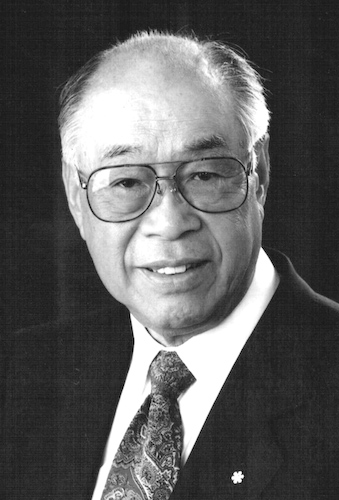
Portrait of Jack Lee, date unknown (Photo courtesy of Robert Lee).
Jack Lee (Jack Wai Yen Lee, 1922-2011) was a representative of the local-born Chinese in Victoria who broke through racist barriers at an early age and later made significant contributions to Canadian multiculturalism as a community leader. His family also epitomizes the Chinese experience in Canada during the past one and half centuries, starting from the time of the gold rush and railway construction in British Columbia to the multicultural era of today.
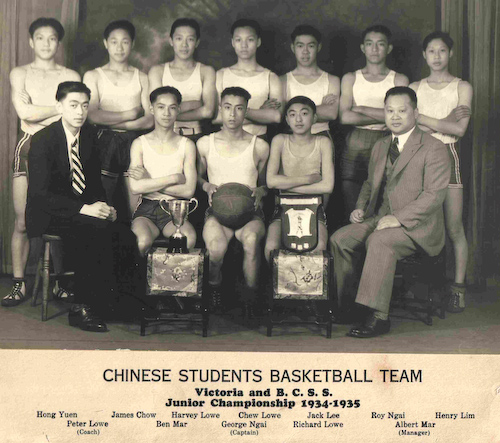
Jack Lee (back row, third from right) with the Chinese Students Basketball Team in 1935 (Photo courtesy of Robert Lee).
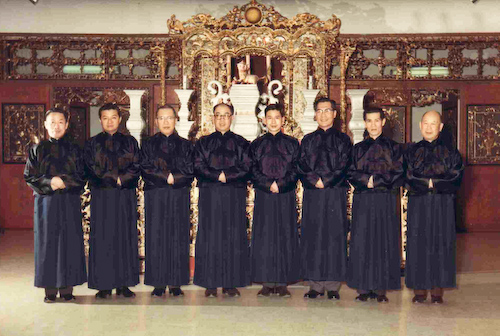
CCBA president Jack Lee (fourth from left) with seven other leaders at the rededication ceremony of the Palace of Saints in May 1966. The shrine was moved to the new office of the CCBA at the Chinese Public School, 636 Fisgard Street (Photo courtesy of Robert Lee).
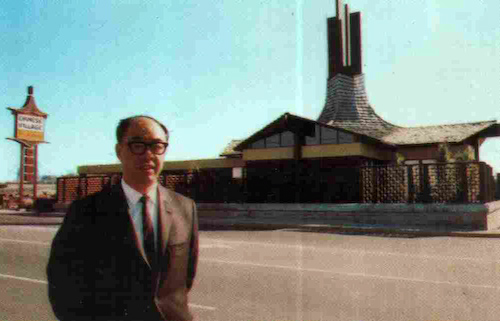
Jack Lee in front of his family business, Chinese Village Restaurant, in the 1970s (Photo courtesy of Robert Lee).
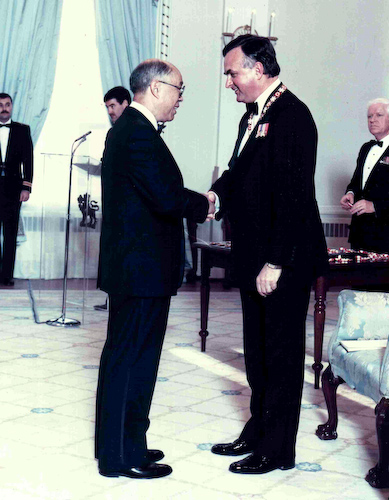
Jack Lee receiving the Order of Canada from Governor General Ray Hnatyshyn in 1989 (Photo courtesy of Robert Lee).
Jack Lee’s great-grandfather, Lee Yin Yew (1831-1887), first came to British Columbia during the gold rush of the late 1850s, the beginning of significant Chinese immigration to Canada. After a transpacific trip to China, Lee Yin Yew recruited Chinese labourers to work on the Canadian Pacific Railway in the 1880s. He also founded a family business, a laundry called Suey Chong in Grand Forks, before his final trip to China and sudden death there in 1887.
As a second-generation immigrant of the Lee family, Jack Lee’s grandfather, Lee Ping Hong (alias Lee Wun Quun, 1878-1945), came to Canada in 1899, settled in Victoria, and started a butcher shop and barbecued meat store called Yuen Tai. Before Lee Ping Hong retired to China, one of his sons and the father of Jack Lee, Lee Wah Kim (aka Lee Ying Quay or Lee Git Yee , 1895-1970), had already immigrated from China to Victoria in 1908, and inherited the Yuen Tai shop.
Although Lee Wah Kim only received a formal education at South Park School (near Beacon Hill Park) until grade eight, he preceded Jack Lee in Western and Chinese education, business ventures and community leadership. He greatly expanded the Yuen Tai shop into the Morley Company in 1935, which distributed groceries across Canada from Victoria to Halifax. Meanwhile, he also inherited from Lee Ping Hong the Mow Hing Lung Company in Hong Kong and expanded it into the Mow Lee Hing Company, which exported goods to Canadian outlets in Calgary, Winnipeg, and Montreal. After the Second World War, he further established the Sino-Canada Trading Company for international trade between the two counties. From 1926 to 1954, Lee Wah Kim also operated a series of greenhouses in Victoria, the first one on Cedar Hill Cross Road, the second on Douglas Street, and the third and fourth on and near Ruby Road (now McKenzie Street). As a leading businessman, he was extremely active in local community affairs, holding various positions, from president of the Chinese Consolidated Benevolent Association, the Kong Chow Benevolent Association, and the Lee Benevolent Association, as well as chair of the Chinese Public School, director of the Chinese Hospital, and a fundraiser for the Jubilee Hospital.
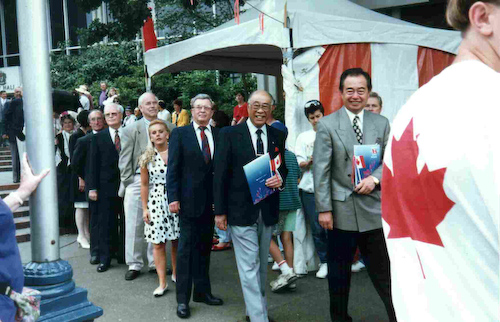
Jack Lee and other recipients of the BC Heritage Award in 1992 (Photo courtesy of Robert Lee).
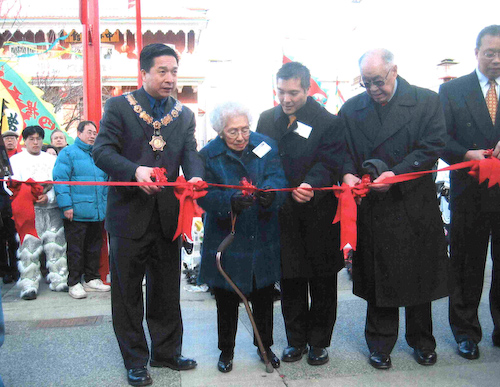
Dedication ceremony for Lee Mong Kow Way in 2005, with Mayor Alan Lowe on the left and Jack Lee on the right (Photo courtesy of Robert Lee).
Jack Lee followed his father, Lee Wah Kim’s steps, but went further as a student of Western education, promoter of Chinese culture, prominent businessman and community leader in Victoria. He was born in Victoria in 1922, just one year before the Canadian Government imposed the notorious Chinese Exclusion Act. But Jack Lee was able to complete his early education in both the Chinese Public School and at public schools, including Victoria High School, and to graduate from the University of California at Berkeley with a degree of Associate of Arts, and from the University of British Columbia with a degree of Bachelor of Commerce. During the Second World War, he served in the Canadian Army (militia) and the Canadian Officers’ Training Corps until his honourable discharge. In the late 1940s, he joined the management of his family businesses in the import and export trade, the distribution of food products across Canada, and greenhouses in Victoria. In 1967, he started his own business venture with partners, the Chinese Village Restaurant.
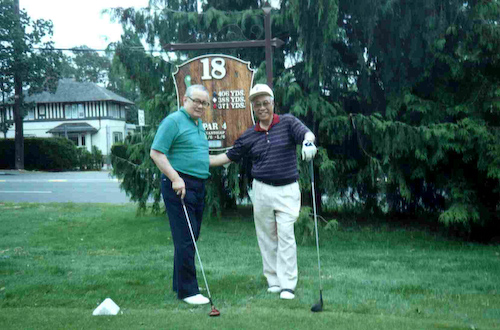
Former Lieutenant Governor David Lam (left) and Jack Lee (right) at the Uplands Golf Course (Photo courtesy of Robert Lee).
Jack Lee was an active leader of both Chinese and other community organizations as well as cultural and educational institutions in Victoria. Like his father, Lee Wah Kim, Jack once served as the president of the Chinese Consolidated Benevolent Association, chair of the Chinese Public School, and as one of the major leaders in the Kong Chow Benevolent Association and the Lee Benevolent Association. He also served on the board of directors of a variety of organizations in Victoria including the Victoria Welfare Council, Canadian Red Cross, United Way, Victoria Publicity Bureau, and the MacPherson Foundation. In addition, he was a member of the Senate at the University of Victoria and a director of the Friends of the Royal B.C. Museum. His contribution to local business, educational, and charitable associations and other community affairs earned him the highest honour among Canadian citizens, the Order of Canada, in 1989. In his old age, Jack became interested in his family history and the local Chinese history. He self-published two books, The Immortality of Heritage and Roots (1995), and The Legacy of Lee Mong Kow (2004). In Jack’s own words, his “hope, dream, and vision is to have racial harmony in a united Canada in this generation, and for generations to follow.” He indeed made a great contribution to a multicultural Canada.
By Zhongping Chen
Source:
Lee, Jack Wai Yen. The Immortality of Heritage and Roots. Victoria, 1995.
Watts, Richard. “For Jack Lee, ‘Family Was First.’” Times and Colonist August 13, 2011: A2.

